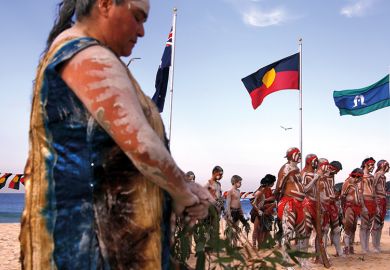It is widely known that “blood diamonds” played a major role in funding the rebel Revolutionary United Front during the ghastly civil war in Sierra Leone (1991-2002).
Yet initiatives designed to keep such diamonds out of the mainstream market have had little impact on the country’s comparatively neglected artisanal mining sector, where small groups of labourers look for diamonds using only shovels, buckets and sieves. Many rely on “supporters” who give them food and tools but only pay them if they find diamonds. A researcher is now taking his film to the United Nations in New York to raise awareness of their plight.
Roy Maconachie, reader in international development at the University of Bath, first went to Sierra Leone in 2003 to study “post-conflict reconstruction” and has been returning to the same village ever since. He soon became interested in mining and built up a close relationship with Fourah Bay College (part of the University of Sierra Leone). One of his current projects involves three researchers from Bath and three from Fourah Bay “sampling water in artisanal gold-mining areas, and looking at what happens to ecosystem services, and how that impacts on livelihoods”.
In an earlier film Dr Maconachie made with Elizabeth Fortin and Simon Wharf, Gender and Fairtrade: The stories of women cocoa farmers in Ghana, they embraced a “participatory methodology” and let the Ghanaian women record their own experiences in an attempt to avoid the dangers of “educated white men from privileged backgrounds coming in and extracting data for academic papers”. His latest project on “Artisanal diamonds, resource governance and formalisation in West Africa” was funded by the American charity Humanity United and employed a postdoc from Sierra Leone, Felix Conteh, who spent half his time in Bath.
Committed to improving the livelihoods of the poorest, Dr Maconachie argued that the best way forward was bringing “illicit miners into the legal domain” in order to “create support to provide better working conditions”. The new film he made with Simon Wharf, a production technician at Bath, Voices from the Mine: Artisanal diamonds and resource governance in Sierra Leone, “starts at the very bottom and works through all the stakeholders at a local level, and the very unequal relations between them. We also look at the top of the value chain, in Antwerp, and get some of the people there to reflect on the issues.” It was recently shown publicly in Sierra Leone and, on 18 June, will be presented at “a UN policy dialogue” with a panel discussion featuring representatives of the World Bank and the Diamond Development Initiative as well an ethical jeweller.
Asked about the question of “blood diamonds”, Dr Maconachie reflected that “Diamonds were certainly part of fuelling the war, but the issues were really about young people’s grievances. If you don’t pay attention now to fair pay, environmental conditions and social issues, the same group of people could get angry again. There’s always that security issue tied to [artisanal mining] as well.”
Register to continue
Why register?
- Registration is free and only takes a moment
- Once registered, you can read 3 articles a month
- Sign up for our newsletter
Subscribe
Or subscribe for unlimited access to:
- Unlimited access to news, views, insights & reviews
- Digital editions
- Digital access to THE’s university and college rankings analysis
Already registered or a current subscriber?









